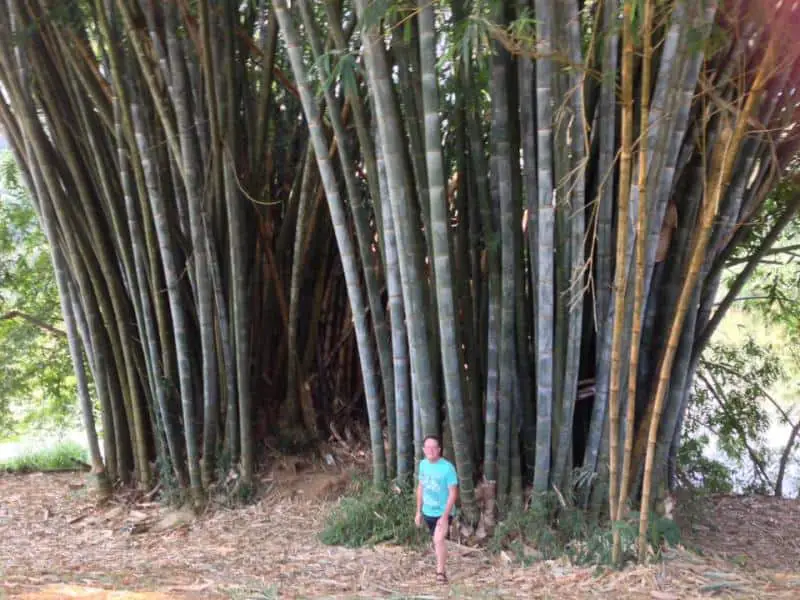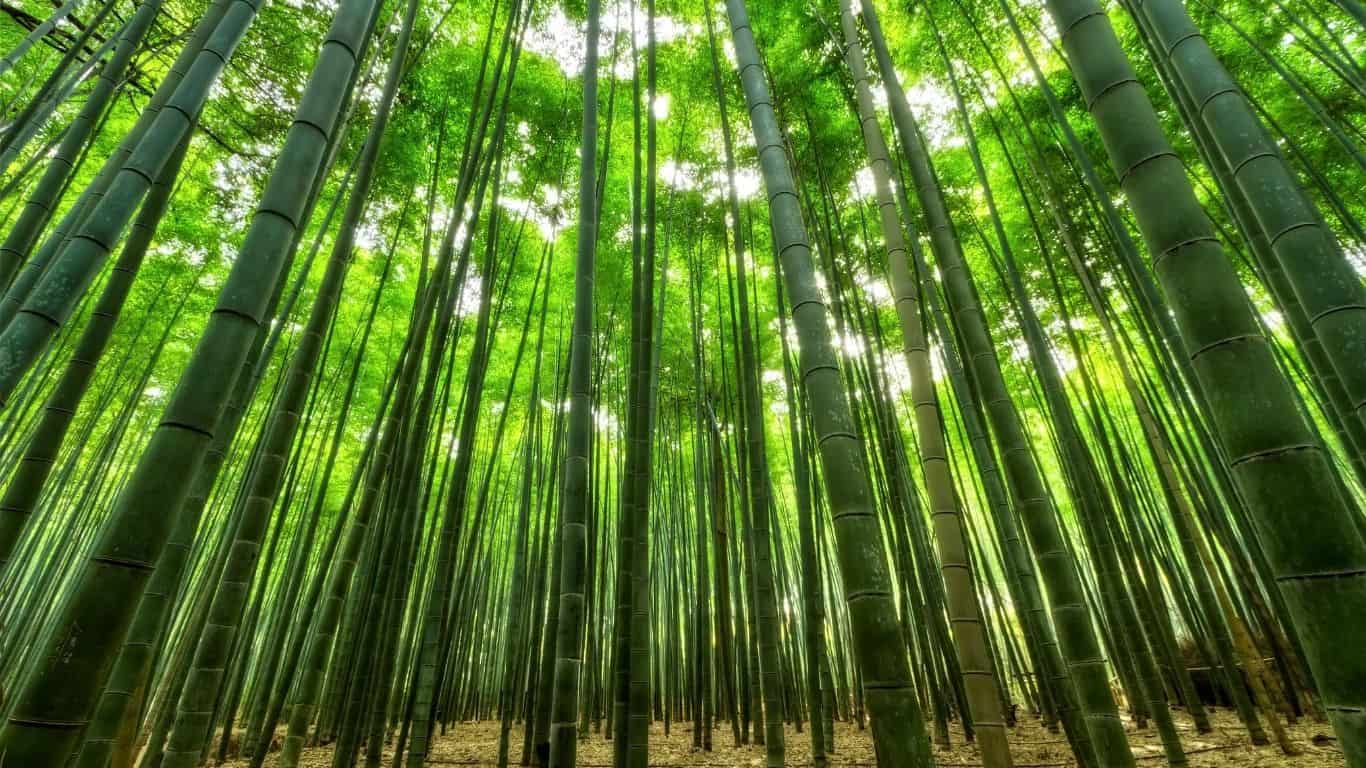Today we will discuss a fascinating plant- The Bamboo and How long does it take to Grow Bamboo? Bamboo is one of the most useful plants in the plant kingdom. You can use it for a variety of purposes from cooking to weaving or construction. Bamboo is still the most important construction material in Tropical and subtropical countries. It is lighter than Iron bars with similar strength. It is a typical grass, the tallest of all of them. The idea of growing bamboo in the garden can have different opinions among different gardeners.
Those who like bamboo may appreciate it and others may hate it for its speed growth and resilience. Trust me growing bamboos is much easier compared to getting rid of them when they invade the entire garden. Although this will never happen if you manage the plantation carefully from the first year. So How long does it take to Grow Bamboo?- It can Take Anywhere between 4 to 7 years for a bamboo culm to mature.
Although the timing of maturity also depends on which growth stage would you consider mature for bamboo. An interesting fact about bamboo is that It is ready to use from the first month of its growth. Only you have to decide whether you need to eat it or use it for any other purpose. It will be ready to cook within 30 days of spring growth whereas the fiber matures till they reach 4-5 years of age. The final use will decide the maturity time for every bamboo plant.

Check out my previous post: The Tallest grass in the world. Garden Facts
The Growth of a Bamboo Plant
Bamboo is a colony Plant. It is grass so the growth also resembles that of ordinary grass but on a large scale. The Plantlife of bamboo starts with a small plantlet or division.
You should get a mature bamboo root division for growing. Never buy fresh division or bamboo pups. They are very fragile and can perish in the absence of a food source. Place it in soil and water it for the first few days. Later you can reduce watering once the plant establishes in its new location.
Bamboo is an evergreen grass so it will continue producing fresh leaves every year. Although the plant will never grow tall or bigger in diameter after 60 days. The First plant will develop a dense Root structure with nodes and internodes with rhizomes.
The underground growth of rhizomes develops into clums or canes in the spring season every year. New growth will grow bigger and taller than previous season plants. This growth pattern is a specialty of bamboo grass.
The first plant or the mother invests its life developing underground runners and dense root systems to support its offspring. That’s why the next generation has sufficient nutrition to grow taller than its predecessors.
Rhizomes burst into a new bamboo pup or clums in early spring with rising temperature. It will reach its maximum height in only 60 days. This is extraordinary for any plant to grow 100 times or more in just 60 days. After that these new plants will continue producing new leaves and feed the interconnected roots. A bamboo plant will never grow in height after 60 days of its growth period.
Again new pups will emerge next year and the cycle continues. The bamboo colony can last for a century or more in healthy soil conditions.
Factors That Decide Growth Rate of Bamboo Plant
There are a few factors that can affect the growth rate of a bamboo plant. The most important of all is the variety of bamboo you choose. Different varieties can differ in size, growth rate, temperature tolerance, water tolerance, and the number of mature rhizome production. This means you will find a varying number of new pups growing in colonies of different bamboo varieties.
Other factors that can affect the growth rate of a bamboo plant includes-
- The Size and Maturity of Mother plant
- Soil Condition
- Average Temperature
- Available Sunlight
- Moisture Level
- The Age of Bamboo Colony
- The Size of Container for Container Gardening
Check out This: How to Plant Rainbow Rose Seeds?
The Size and Maturity of Mother Bamboo Plant
The First plant or the mother bamboo plant is the key to a successful colony. If you start with a pup then it will take several years before the colony even start producing new clums. Therefore buy only healthy plants and make sure they are pre-established and are not fresh division.
Fresh bamboo divisions are prone to damage by environmental factors. They can die without an abundance of nutrition.
It is better to purchase a tall bamboo plantlet with multiple clums growing adjacent forming a colony. This will ensure healthy underground growth for better bamboo colony establishment.
Soil Condition for Bamboo colony
Bamboo is a versatile plant. It can grow in different soil types and conditions. Although it prefers soft moist neutral ph soil with good drainage.
If you are planning for growing a new bamboo colony then you should consider soil amendment for faster growth. You can amend the soil with sand to improve drainage. Compost can help in improving the organic matter content in the soil. It will drop the ph of the soil. Therefore if the soil turns acidic then add wood ash or lime to balance the ph to 6.8-7.0.
You can add Nitrogenous chemical fertilizer to give the bamboo batch a nutrition boost. This can speed up its growth for several years. You can also try bamboo plant fertilizer for the best result.
Effect of Temperature
Bamboo plants growing in cold areas have smaller heights and a slow growth rate. These plants can grow twice their size in warm tropical conditions. So temperature is definitely a decisive factor for the growth of bamboo plants.
In a warm tropical climate, bamboo can grow up to 100 feet or taller. Some of them can grow at a tremendous rate of 4 feet or 1 meter per day.
Check out popular Bamboo plants on Amazon.
Sunlight
Most bamboo varieties prefer a minimum of 4 to 6 hours of sunlight every day. Some of them can grow in partial shade although it is not good for bamboo plants.
Bamboo plants growing in shade will have smaller heights and a slower growth rate. Usually, container gardeners prefer growing bamboo in part shade. It is alright for them as they don’t need tall bamboo canes. Even for container gardening, these plants need occasional direct sunlight else the foliage will turn pale green or yellow.
Impact of Water on Bamboo Plants
Water is an essential aspect of the establishment of a bamboo colony. The colony requires consistent moisture for the development of underground runners and new rhizomes. The evergreen nature of bamboo also compels it to consume water for healthy green leaves.
It is an interesting fact that bamboo plants can’t withstand waterlogging. They require a continuous water supply although soggy soil is bad for most common garden bamboo varieties. If you ignore a few exceptions then most other bamboo varieties will face root rot within 1 week of waterlogging. That’s why proper watering is essential for the growth of the bamboo colony.
Excess moisture around the roots will damage the rhizome and deteriorate the entire colony’s health. Keep in mind the damage in the root will affect every bamboo plant of the colony. They have a common root system that feeds the colony.
The Age of the Bamboo Colony
The Age of the bamboo colony is a very important factor for the growth of new plants. An older colony will grow bigger taller and stronger bamboo plants. On the other hand, the same colony may have grown half-size bamboo plants in its first couple of years.

Therefore have some patience with bamboo plantation. It will take time, at least 4 years before you may get any full-size bamboo in the colony. The Colony of 2 Parent plants may expand to 30 bamboo or more in 4 years. 8-10 bamboo among all will have a maximum size. You will get more mature full-size bamboo from the 5th year of the bamboo plantation.
The new bamboo colony will never develop maximum size plants. Therefore best option in this situation is to wait and care for the colony for 3 to 5 years.
Also read: Can Gluten in Fruits and Seeds Harm You?
The Size of Container or Planter
If you are a container gardener then you must choose the planter according to the bamboo variety. In fact, you should also choose the variety according to the local climate. It should have high-temperature and drought tolerance even more than the expected value in your zone.
Containers are not sufficient in insulation, water, or nutrition. Therefore, Grow a hardy short variety of bamboo in the container and let it grow for a couple of years to see its maximum height.
The Size of the container will decide the number of plants or canes that will accommodate. Bamboo does not have any taproot or main root. Instead, it grows supporting and fibrous root system with dense node and internode structures. It will require space to grow underground runners. These runners will develop new pups or clums for the colony.
So use a wide container with a minimum of 18 inches depth for growing bamboo plants. Bamboo plants usually never reach their optimum size in containers.
How long does it take to Grow Bamboo?
It will take anywhere between 5 to 8 years for bamboo to grow and mature in a colony. A 10-year-old bamboo colony will have a few optimum size bamboo plants ready for harvesting.
Bamboo is the fastest growing plant. There is no doubt in this statement. In tropical conditions, some bamboo varieties can grow up to 1 meter in a single day. This growth rate is equal to an average of 0.00003 km/hr or 8.333333e-6 m/s speed.
Trust me this rate is too much for any plant. A Bamboo plant can grow more than 200% of its initial size in just 60 days.
Mostly 60 days growth is the maturity growth time for bamboo. Each new bamboo plant will grow to its maximum height in just a couple of months. They will never grow in height or breadth after this time. Although these plants will keep producing new leaves every year throughout their life.
If you consider the maximum height as a measure of maturity. Then 60 days or 2 months is the maturity time for the bamboo plant. Otherwise, you have to be specific on the need then decide the maturity.
You can compare bamboo maturity in 4 aspects. These are-
- Edibility
- Craft Making
- Fiber Uses
- Construction
Edibility
If you are planting Bamboo fr eating or cooking purposes. Then It will mature within 30 days of sprouting. Although this will happen for the second year of plantation. In the first year, you will plant a bamboo plantlet and it requires 1 year to develop an underground root system.
New clums will sprout in early spring and they will be ready to cook within 30 days. The new bamboo shoot or clums are often harvested within 10-15 days. They will gradually become hard and fibrous after 2nd week.
Craft Making
Bamboo plants will be ready for craft making or weaving in the 2nd year of plantation. You can easily scale thin lateral pieces from a 2-year-old bamboo. The fiber is still very flexible and soft which helps in bending or molding bamboo sticks.
Old man stick or wooden umbrella handles are a perfect example of molded bamboo branches. Bamboo fibers become hard and strong with age. It will become hard and woody after 3rd year. Therefore, It will take only 1 to 3 years for bamboo to be ready for craft making.
Fibre Strength
A bamboo plant and its fiber are at maximum strength at 4-5 years of age. This is the best timing for fiber extraction from bamboo. Bamboo fiber is popular in the furniture industry. You can make different furniture items like chairs, tables, cots even plyboard with bamboo wood.
If you are growing bamboo for carpentry work then harvest it in the 4th or 5th year. 5-year-old Bamboo plants are best for fiber uses especially for furniture making.
Construction
Bamboo plants growing in a decade-old colony is best for construction works. These bamboo are of optimum size with maximum strength. Even at that age, each bamboo plant must mature for at least 4 years before harvesting.
Construction works require strong support and a bamboo fiber will mature in 4 years. So you have to grow bamboo colony for at least 7 years and then wait for another 3 years for the final batch to mature before harvesting. Usually, an 8 – 10-year-old bamboo colony is best for construction works.
Can You Speed up the Growth rate of a bamboo plant?
Yes, we can speed up the growth rate of a bamboo plant with little effort. Keep in mind a mature plant will never grow big. It can only produce new leaves and branches every year. Although you can prepare the colony and boost its growth in order to produce bigger stronger canes in the next season.
You can feed the bamboo colony once in 3 months with an all-purpose fertilizer. Also, add urea or NPK 46:0:0 with Azotobacter once every month to booth rhizome health.
At last, add 5 kg of compost with 200grams superphosphate and 500 grams of Urea, 150 grams of DAP, and 100 grams of Potash to the topsoil early in the fall. Water regularly for the next few days and spread the mixture evenly to the colony size.
Never allow chemical fertilizer to stay in any spot else it may burn the roots. Instead, water properly to dissolve and distribute the fertilizer evenly throughout the bamboo root system. The use of chemical fertilizer is completely optional for the bamboo colony. Although it will help you boost the growth of new canes in the spring season. These fertilizers can reduce the maturity time by 2 years.
Does bamboo really take 5 years to grow?
A bamboo plant only needs 60 days to grow. It will reach its maximum height in this time. The next 4 years and 10 months are essential only for the strengthening of fibers.
The plant will never grow bigger or thicker during this time. So technically bamboo does not require 5 years to grow. You can leave these plants to mature if you need them for heavy work.
Cultivators and farmers prefer maturing bamboo plants and colonies for 5 to 8 years. They can survive for 10-12 years in a colony. Although these plants will lose their strength from the 6th year. 4 or 5-year-old bamboo plants are best for all types of work except for cooking. You have to harvest the new clums with 2-3 weeks of sprouting for cooking purposes.
How quickly can bamboo grow?
Bamboo is the fastest growing plant on earth. It is a colony plant that can grow up to 1 meter every day. Often in tropical warm regions bamboo plants can grow more than 100 feet high.
The Chinese Moso bamboo is one of the fastest-growing bamboos in the world. the warm humid tropical and subtropical climate help the bamboo plants to grow at their maximum rate.
Bamboo plants can grow at a rate of 0.00003km/hr in these areas. This doesn’t seem much although for any plant this is the rocket speed growth.
Therefore we can say that bamboo is the fastest growing plant with a growth rate of 3 feet or more in 1 day.



